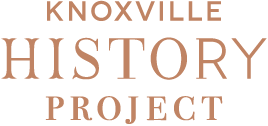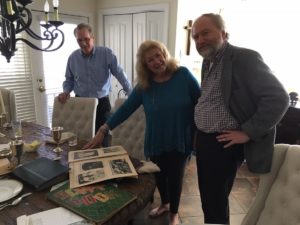Carol Mayo Jenkins Oral History Conversation
A Conversation with Carol Mayo Jenkins and Jack Neely
Also present, Carol’s second cousin, Phil Claxton and Paul James, KHP
Monday, February 18, 2019
CAROUSEL THEATRE/BRANDON MAGGERT
Carol Mayo Jenkins: Dr. Paul Soper, Fred Fields, and Russell Green were the three directors. And then they built the (Carousel) Theatre and nobody had ever built anything like that before. And they didn’t know if it was really going to work. They poured the concrete and they put the beams up and then they dropped a plumb line and it was one-eighth of one inch off center. And they cheered, because they didn’t know. The theatre was extraordinary in its day.
Jack Neely: Tell me, the neighborhood was just a residential neighborhood at the time. It wasn’t UT. Do you remember anything about the neighborhood? It’s surprising that the Carousel was on South Seventeenth Street.
Carol: I know the street came in front of it, and of course, all of those houses that were only torn down a few years ago. And I know that, oh, it was wonderful to go to the theatre. The audience used the two bathrooms, so I don’t know where the actors, I guess we just didn’t. Or, as Dale (Carol’s Grandfather) said, we went out in the woods. And then on the side, there was a place where they sold soft drinks and things. And what is now the lights, where the stage manager is, that was the office. That is where Mrs. Faust sold tickets. So, I don’t know what controlled the lights. And In the dressing room, there was a dressing table with things like that on either side, and the mirrors and you could go and sit. Mrs. Soper did everybody’s makeup and the costumes.
Jack: Tell me about Mrs. Faust. I know that she worked with Patricia Neal at one time.
Carol: Emily Mahan Faust. Well, she is Patricia Neal’s cousin. And her family, the Mahans, were Kentucky coal mining people. That’s where the money came from. They came down to Knoxville and Mrs. Faust went to UT. She always wanted to be an actress, so she went off to New York and she went to acting classes in Carnegie Hall probably in the early 1930s. Mr. Faust went up after her and said you have got to come home and marry me. So she came home and married him.
Jack: So she never played on Broadway or anything like that?
Carol: No. And she never acted, that I know of, in all of the sort of local community theatres and things. There were a lot of local actors that I thought were wonderful. You (Jack Neely) wrote a piece about my Aunt Barbara Gentry. She’s not really my aunt, but she was one of my mother’s best friends so I grew up calling her Aunt Barbara. But somehow Mrs. Faust was always Mrs. Faust.
Jack: Barbara Gentry had some genuine Broadway credentials. It’s interesting just the combination of people. They weren’t all UT connected. They were just people who loved drama.
Carol: I did a lot of plays with Frank Lester, who was Lorayne Lester’s husband. He was a professor of something. And, of course Lib Rike acted in the plays and Irma Witt, her mother acted in the plays a lot. And then also, Collin Wilcox who was a seriously very fine actor, her mother acted in the plays and her father was a professor at the University. Collin was in some plays, too, before she left and went to New York. She was older than I. She was gone by the time I started doing stuff. I knew her sister Geramie Wilcox.
Jack: They lived in the neighborhood. They didn’t have to get in the car to go there, just around the corner.
Carol: Yes. And Collin played Mayella in the film To Kill a Mockingbird.
Jack: She was also in some Twilight Zones and some things like that. (She had a small part in Jaws 2 – PJ)
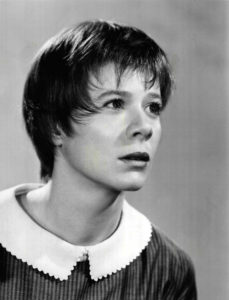
Collin Willcox (Wikipedia)
Carol: She did a lot of theatre. She was a really good actress. And so I wanted to be in the plays, and my mother, who was very smart, said why don’t you usher. So I volunteered to usher and I was still in high school and I got all of my little friends together. I went to Salem Academy in Winston-Salem NC but I was home in the summers. I was the head usher, and I was the best usher they ever had. So then the next year they were doing “The Petrified Forest”, this was when I was seventeen (1956) and I had just graduated and I went to audition and I got the part. I was in it with John Cullum and Bob Mashburn and Buddy Maggart, who is Brandon Maggart, who went on to have quite a career. He starred in “Applause” with Lauren Bacall on Broadway and he did a wonderful series called “Brothers.” He was the oldest brother and he was a contractor, and the middle brother or the younger brother was gay. It was like the first depiction of gay on American television. And, of course, he was this big macho guy and he couldn’t understand his brother at all. It was a comedy. And it was terrific. I remember watching it. And then I ran into Brandon a few years ago. He now lives in California. He was with Lynn Redgrave until she died, and now he lives in Venice, California. And, he has a bunch of kids, one of his daughters is Maude Maggart, who is a cafe singer in New York, and another of his daughters is (a well-known singer) Fiona Apple.
Jack: What was he (Maggart) doing here at the time?
Carol: He was in school.
Jack: In school at UT studying….they didn’t have much of a theatre program at that time did they?
Carol: Oh no, none of us were studying theatre. It was Speech and Theatre.
Jack: I haven’t run across his story yet, so this is valuable information.
Carol: It’s a terrific story. He’s quite a character. He’s written a book, something In These Eyes Sweet Madness Lies.
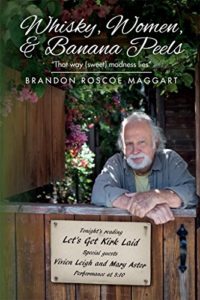
Jack: Is it an autobiography? It might have something about UT, Knoxville.
Carol: Yes. Brandon Maggart, when he was here he was known as “Buddy.” So that was the first play and the bug bit me. So, I went to Vanderbilt, because my father said you have to go to school in the South and you have to go to a co-educational school, because I had been in a girls school for four years. And the co-educational schools in the South, it was kind of Duke or Vanderbilt, and daddy went to Vanderbilt so he sent me to Vanderbilt. But Vanderbilt didn’t have much of a theatre department, so I asked him at the end of the first year if I could come home. And he said yes. So I came back to the University and this is when I did all of these plays.
One that I remember specifically is “Desire Under the Elms.” Daddy read it and said you can’t be in that play, chiefly, I guess, because he was an Obstetrician and she kills her baby at the end of the play and he thought that was horrible. I remember we had an amazing argument and he asked me, he said, “I go to work and I listen to peoples’ problems all day long. Why should I go to the theatre at night and listen to peoples’ problems?” And I was seventeen, and I didn’t have an answer for him. But Dr. Paul Soper asked if he could talk to daddy, and daddy agreed. So he met with Dr. Soper and I will never know what was said but he came home and said you can be in the play. And he actually came to see it. That would have been 1958 or 1959.
Jack: Do you remember any other actors who were involved then?
Carol: Oh, let’s see. Well, Jim Walls, Jimmy Walls was the son of Dr. Jim Walls (James G. Walls), who was the Geology teacher at UT. Phil (Claxton) and I went to a dinner in the Thompson-Boling Arena, and it was for people who had given money or something. And we sat across from these two sweet old people. And Phil can talk to the wall. So he got this guy to talking, and he said that he had gone to school at UT on the GI Bill, and nobody in his family had ever gone to college and he didn’t know what to study. But he took this Geology class, Dr. Walls, and it was a great class, he really loved it, and he got interested. So he majored in Geology. What do you do with Geology?
Jack: You can teach or prospect for oil, I suppose.
Carol: There you go. He got into the oil business and he’s made millions and he’s given millions to the University. (asking Phil) Do you remember his name? (Phil – No) He was such a cute guy. He told us with great pride that he was 80 years old and he had given a lot of money and all because of Dr. Walls. So his son, Jimmy, was in the plays. And then a couple of summers a young woman named Miranda Knickerbocker came down. Her father had been Red Knickerbocker, who had been a reporter, a rather famous reporter, I think. Her uncle, whose name I can’t remember, was the head of Arts and Sciences, so that’s why she came down here in the summers. And, she was in the plays, she was a great friend of mine. And she later married a man named Sorrell Booke who was on one of those hillbilly shows. One of the first of the big hillbilly shows. (Booke played “Boss Hogg” on The Dukes of Hazard.) He was very well-known and a good New York actor. And it was really because of Miranda that I got interested in going somewhere else. Daddy had said after two years you can go anywhere you want to go. He meant college, but where I decided I wanted to go was the Central School of Speech and Dramatic Art in London. But he let me go.
ACTORS & PERFORMERS
Carol: Johnny Cullum did a lot of plays. I first met Johnny when I was a kid and I was studying ballet from Suzanne Moore. I went to ballet class every day. I was a chubby little girl, but I loved my ballet lessons.
Jack: Tell me a little bit more about that, Suzanne Moore Ballet, I don’t know about that.
Carol: You don’t know Suzanne Moore? Well, in my class was Ann Taylor. Ann was a little bit older, but she was in my class and I can’t even remember who else.
Jack: It was just a ballet class here in town? Where was it?
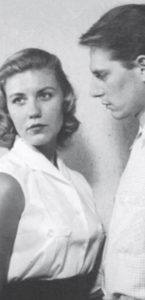
Carol Mayo Jenkins and John Cullum, circa 1950s. (University of Tennessee)
Carol: It was downtown, and this was when I was in middle school. I went to Tyson and after school all the kids would go up the street to Karns Drug Store after school. But I didn’t. I got on the bus and went downtown to ballet class. So, it was somewhere downtown, I don’t know. And then I would walk around the corner to the Acuff Clinic where my father was and he would bring me home. John Cullum was Suzanne’s boyfriend and he was also a tennis pro. But he was a dancer, I guess because of Suzanne. And we did a dance concert at the UT Auditorium with the Knoxville Symphony and Johnny was the “premier dancer” and Ann and I were in the “Corp de Ballet.” And a woman named Mary Jo Brucing who played the harp with the Knoxville Symphony, was also a dancer.
Jack: Interesting. I think I had read those things about John Cullum before. He was a triple threat, I suppose.
Carol: Absolutely. And when I went to see him in “Urinetown” when it was on Broadway, he was dancing up a storm. He was really good.
Jack: “Urinetown” was a big hit about ten years ago.
DAVID VAN VECTOR
Jack: It’s amazing how all of these people came together and had such interesting careers after that. Another one, did you run across David Madden, author? He did some acting at the Carousel.
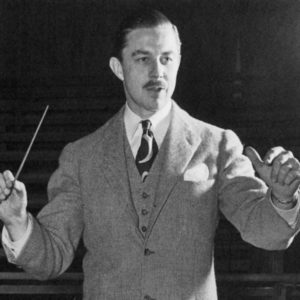
David Van Vactor (University of Tennessee)
Carol: Yes. I don’t think I ever did anything with him. He, too, was a little bit before my time but I remember him. And then there was also Dr. Van Vactor who was conductor of the Symphony. His son David was in my class, I guess, in school. His daughter was older. Her name was Adrian. But she went off to Hollywood and, I guess felt that Adrian Van Vactor was not a good-enough name so she changed her name to Raven Harwood and walked around with a raven on her shoulder. She must have been crazy as a loon, I don’t know. As if Adrian Van Vactor wasn’t an extraordinary name. But mother always told me, and you would know more about this than me, but it was after the war and the University brought Dr. Soper, Dr. Van Vactor, and Kermit Ewing, and that was really the beginning of the arts in Knoxville. Those three men did amazing stuff.
PAUL SOPER
Jack: Tell me about Dr. Soper. I guess you knew him best of those.
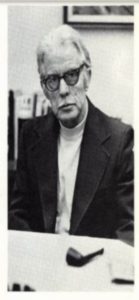
Dr. Paul Soper (University of Tennessee)
Carol: I did. I loved Dr. Soper. I didn’t know a lot. He was not very tall, he had white hair, and he was quiet and dignified. And Helen, his wife, was very gregarious and energetic. But to me, they were, like, up on a pedestal. So, I never really knew much about his life. His sons were both friends of mine, Gordon and, what is his other son’s name, I can’t remember. Anyway, they are both doctors now. But, he apparently was quite a scholar, quite a theatre scholar, and in his own quiet way he got things done within the University in order to, like, build the Carousel and build the beginnings of a professional theatre. I do remember one time I went to his house, there were a bunch of us there, and it was baseball season. And he told me about a wonderful essay called “Baseball is Caring” written by, I think, Thornton Wilder. So he had wide-ranging interests. And then there was, of course, there was Liz Broyles, who was sort of a raw-boned woman and a master carpenter. She was sort of the technical director and she built all of the sets and did everything. And she also acted some. And then Mary Ann Burnham who became one of my best friends. She was from New York and I think she had some cousins down here in Knoxville or something. So she came down here to the University. She was in a bunch of the plays. And then, who else…..
BARBARA GENTRY
Jack: Tell me more about Barbara Gentry.
Carol: Aunt Barbara was very, very beautiful and she and my mother were friends from childhood, with Edith Madden and Elizabeth Caswell Price, Ethel Lotspeich, she became Mrs. Chub Smith (Mrs. Charles H. Smith Jr.), of the Journal, you know. Elizabeth Price became Mrs. Robert Lewis McClure and then Mrs. Heinsen.
Jack: Cecil Metheny, I knew her. Cecil Metheny was up at the top there. I knew her. She is actually a very distant cousin.
Aunt Barbara was a Fulton and Mr. Fulton invented the Sylphon, which is a little thing about that big that planes can’t fly without. So, he made a lot of money. And she had an older brother, Jack, who was very handsome and everybody loved him, and he was a lot of fun, and he was killed in an automobile wreck on Kingston Pike. So her mother retired to her bedroom, and from her bedroom window she could see his grave over in Highland Memorial, and she never came down again. So Mr. Fulton was very anxious to make sure that Aunt Barbara had a lot of fun in her life. So he was always taking mother and Aunt Janie and Aunt Barbara … they went to Bermuda, they went on a cruise, they would go to Florida, things like that. And Aunt Barbara was LOTS of fun, she had a terrific personality. And then she went off to New York. She ran away! I think she was like at Holton-Arms School or something in Washington, and she climbed out the window and ran away to go to New York to be an actress. And she married an actor, whose name was something Gentle. And mother went up to see her in New York, mother was in New York so she went to see Aunt Barbara. Aunt Barbara was trying to iron shirts and she had no idea how to iron a shirt. And neither did mother. But they were both smart, so they sort of figured it out. But that didn’t last. It was very hard. And Aunt Barbara came home a divorced woman. Mother was at her wedding. I think I’ve got some of her wedding pictures. But this was before I was born.

Former Weston Fulton Mansion on Lyons View Pike. (McClung Historical Collection)
Jack: She married someone named Gentle and then Gentry?
Carol: And then she married Fenton Gentry, who was just the sweetest man in the world. He had been a Rhodes Scholar and he had been almost an Olympic swimmer, I think. He was kind of a super guy. But he was dull…just dull. So the marriage went on, they did fine, they had a son. They lived in the gate house of the Fulton estate (on Lyons View Pike). The Fulton estate was built for parties. It had a ballroom on the top floor. But they never had many parties because of this great tragedy.
Jack: I think her first wedding was there. I’ve seen descriptions of it at the mansion. It was probably the biggest thing that ever happened there because they were naming all of these celebrities who were there. People from Hollywood came and it was a big deal. They were, nobody really famous today, but they were people who were famous at the time.
Carol: So Aunt Barbara was another one who acted in the Carousel, and I saw her do “A Streetcar Named Desire”, which I thought was wonderful. But, you know, I was a kid. I don’t know what it was, really… But at one point my mother reached over and grabbed my arm and said, “That’s Barbara’s wedding dress.” It was the scene where Blanche is getting dressed up to go out and she wore her wedding dress. That would have been the late 1950’s, sometime in the 1950’s. And I always loved her. I just loved her. She was so much fun and she was bright and she was VERY smart. She was the one of Mr. Fulton’s children that was really like him….that was smart like him.
MAYOS
Jack: Well, we haven’t talked about the Mayo Garden Center at all, yet, but tell me about…did you ever work there or have any connection with that?
Carol: I didn’t. It was started by Daniel Redmond Mayo… he started the store and it was originally on Gay Street and then it moved to Wall Avenue. Dale was his son. That was my grandfather. I have a wonderful letter from my grandmother to Grandpapa about the store.
Phil: Carol, you gave a lot of this information to the lady who Sam Venable got to write that article about your mother?
Carol: I did. My grandmother wrote this…what happened was Daddy Dale, apparently, I never knew him, but, he was, I believe, very gregarious, very social, lots of fun, and a very, a good business man. Grandpapa, when he would come to visit, Grandpapa would sit at the head of the table and talk about the evils of the middle man. And, he was a middle man in business. But, it was during the Depression, and the Depression, of course, was awful, and many of his friends were jumping out of windows and things. But Mayo’s did okay because it sold seed and I believe mother told me once that he accepted scrip and that’s one of the ways he kept the store kind of going. And, they managed to, mother went to Salem, they managed to send her away to boarding school in the middle of the Depression.
Jack: Do you remember visiting the store as a kid?
Carol: Ohhhh…yes! Yes!!! Well, downstairs, you know, there were the big windows, and then there were along there, they still have them at Mayo’s, the drawers that you pull out and you can run your hands down into the seeds. They still have those, don’t they, in Bearden? I think they still have them. And then there was a center staircase and upstairs there were two, like, balconies that came out like that. And after the War, this one was Uncle Dan’s office and this one was Uncle Claxton’s. They were open, they didn’t have walls. And then there was a slide that went down to the first floor, and they would slide the big bags of seeds down. But, it was a GREAT slide for a little girl. I used to slide down. And then upstairs there were more offices. There was Miss Mildred, who was the secretary, and Mrs. King, who was the accountant, and that’s who mother had working with her. She had some, occasionally she could hire some guys to come help with the heavy stuff. But you couldn’t find anybody, you know, everybody was just gone. I remember when the seeds came in, they would come in late at night, and mother and my grandmother and I would go up….in the back of the store there was a loading dock and then there was an alley behind that on Wall Avenue. There was an alley back there where the trucks came in. And we would go up and sit all night while they were unloading the seeds and mother would be checking everything. My grandmother wouldn’t let mother go by herself; and if they both went, there was nobody to take care of me. So, we all three went and we would sit up on the loading dock all night while the seeds were being….I thought it was a great adventure.
Jack: Wonderful. The seeds. That the sort of thing you can’t look up…the slide and all of those things.
Carol: And then after the War, when they came back, Uncle Dan and Uncle Claxton were each other’s very best friends. They absolutely loved each other. They never agreed on anything. And, after the war, my father wanted to re-do his residency in obstetrics. He had been doing surgery in Europe. So, we, he went to John’s Hopkins to re-do his residency and we lived in Baltimore for a year. And, my grandmother called mother and said “You have to come home. They’re going to kill each other. This is not working.” So, mother came home and she said, “This is the way it’s going to work. Dan, you will do the wholesale. Claxton, you will do the retail side.” Because Uncle Claxton had the same kind of personality that Daddy Dale did….very outgoing and gregarious and fun. Uncle Dan was much more reserved and loved the seed business. So, he did the wholesale side. And it was like that until just a few years ago, I think. And then after the War, mother continued to work at Mayo’s. She did all of the ads because she was an artist. She did all of the layout and everything with the ads. And finally she stopped doing that. And then sometime later, in the ’70’s I guess, neither my brother nor I were interested in the seed business, and she saw, you know, two big families and she thought she needed to be out of the way. So, she sold her interest to Uncle Dan and Uncle Claxton. And now, I think, did Sam sell the wholesale side?
Phil: I think…did he just close it or sell it? I don’t know. I was told he didn’t have… I haven’t talked to him recently.
Paul: And Claxton is still running the Bearden store?
Phil: Claxton, Jr. is running the Bearden store.
Carol: Claxton, Jr. Well, actually now, the business has been bought by his daughter, Elizabeth Cox, Thad Cox’s wife, so now she runs the business and that’s great.
Paul: And there’s just two stores, there’s one out West?
Phil and Carol: There’s three. One is out on Emory Road.
Paul: How long has that store been in Bearden in its present location?
Jack: As long as I can remember.
Carol: Well they … what happened was … it was on Wall Street and the TVA (Tennessee Valley Authority) took the land … took it.
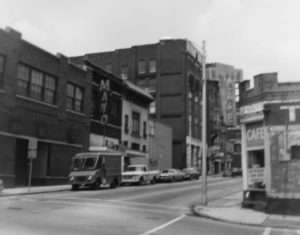
Mayo’s on Wall Ave, 1973 by Jack Neely.
Jack: Ok. Yeah, in the early ’70’s. And it wasn’t in Bearden until then?
Carol: No. And Uncle Claxton sat at his desk when they came with the wreckers to tear down the building. They had to physically move Uncle Claxton’s desk out onto the sidewalk.
ELKMONT/TENNESSEE WILLIAMS
Carol: Elkmont…Daddy Dale bought the cabin, there were two cabins that were set-offs. They brought them up for the loggers. They brought them up on the railroad cars and set them off and they had two rooms with a fireplace in…they built a fireplace in between. So he bought one. They both belonged to Colonel Townsend. And one was his and one was his daughter’s, and we never figured out which one was which. We always felt terribly guilty that we owned the cabin that had been Colonel Townsend’s and Cissie and Larry didn’t have a cabin. But then they bought one, so that was good. But that was in, mother was born in 1915, so I guess that’s about when he bought it. And I have a couple of, I don’t know where they are, wonderful pictures of mother and Uncle Dan when they were that high, holding hands going down to the swimming hole, and then another one of them when they were teenagers, just their backs, holding hands going down to the swimming hole.
Jack: Here’s a dramatic shot in the dark, but did you have any connection with the Tennessee Williams’ family? Considering they had Elkmont connections, too.
Carol: As a matter of fact, yes we do. We’re not kin to them. But Tennessee Williams’ aunt, when he would come to visit in the summer, she had a room, a place in the clubhouse. Yes. So they would go up there. And, I met him once at a party. My friend Jane Alexander was having a party at her house up north of New York City. And she had a swimming pool….her house backed into a national park area, so there was a swimming pool that was dammed up from the mountain stream that came down. And Tennessee arrived and stripped off his clothes, put on his bathing trunks, and dived into the pool and swam and swam and swam and swam. Loved it. So, he was lying on the grass, warming in the sun, and I went over and sat down next to him and said, “Mr. Williams, my family, I grew up, my family had a house at Elkmont.” “Oh,” he said. “I learned how to swim in the Elkmont pool and I’ve always loved mountain water.”
So, there was that. And then my grandmother told me once, well, several things. They did “The Glass Menagerie” on television with Katherine Hepburn, and Katherine Hepburn was not good because she’s a New Englander. She’s not, she didn’t understand. So, I ask my grandmother if she liked it, and she said no, she didn’t. And, I thought, “Oh,” And I said, “Well, why didn’t you like it?” And she said, “Well, I don’t know why he had to write about his father like that. His father was a VERY nice man.” I said, “Ditty, did you know Tennessee William’s father?” Well, yes, he used to call on me from time to time.” He was one of her gentlemen callers!
And then she told me a story about Miss Ella. Miss Ella had a party and she invited the president of the university and she did not invite his wife. So, all of her friends, and Ditty was one of them, that little group of friends, got very concerned and they decided somebody had to speak to her and they decided Ditty was the one who should speak to her. So Ditty did, and Ditty said, “Ella, I’m sure it’s just an oversight, but, you know, you did not invite” … I don’t know who the president was at that time, And she said, “No, I intended that.” And Ditty said, “Well, why?” And she said, “Well one has to draw the line somewhere.”
Jack: Did you ever know her at all? She was really a character, it sounds like.
Paul: Who was that, Jack?
Jack: Ella Williams, who was Tennessee’s aunt, and was never married. She had a gift shop downtown for many years, and sold kind of exotic things. It kind of reminds me of stories about Martin Hunt’s aunt’s place.
Carol: Aunt, yes, well she, too, was a great friend of my grandmother’s. And this house, I’ve really got to do something. I mean, it’s overflowing with stuff, because I’ve got all of my grandmother’s stuff and all of my mother’s stuff and these endless ceramic fruit arrangements and flower arrangements. There’s one right over there. And she bought them all from Martin Hunt’s aunt. She had a back room where she had sale stuff. And Ditty would go up there and buy.
Jack: Yeah, Mary Gill.
Carol: Mary Gill.
Jack: But Ella had this place, really exotic place downtown. She sold some fashion accessories, but also just oddities. She had a painting that she claimed was from the castle where Rasputin was murdered. But she was a card champion, she played, I forgot how many different games. But you read about her in the papers as the champion whist player, or something like that, in those days. And, she smoked cigarettes, which was scandalous in 1900, roughly. Her original shop was on Clinch Avenue near Gay Street. And, Tennessee Williams was here several times for a weekend or a week, or something like that, but not for very long. But they began to worry about their daughter Rose, and that they wanted her to be part of Knoxville Society because she wasn’t fitting in in St. Louis. So, they gave her some debutante balls and things like that here at the country club. And, there were lots of parties for Rose.
Carol: One of Tennessee Williams biographies has all of that and the names of the people, who were all people I know or knew of.
Jack. Yeah. Tennessee got mixed up about a few things. He apparently wasn’t very good at geographical details and things like that. But he has something about that in his autobiography. But Aunt Ella, and I think this is in his autobiography, Aunt Ella had a collection of the glass animals that she gave to Rose who put it on this, kind of, apparently cleverly-designed dress, a dress with little glass animals. And she became preoccupied with them and apparently Tennessee noticed this and worked it into his first play.
Carol: “The Glass Menagerie.” Well, of course, “Suddenly Last Summer” takes place at a place called “Lyons View.”

1954 Playbill (University of Tennessee)
Jack: Even though it’s in Louisiana, and that’s no coincidence. And I’m told that his family had some experience with Lyons View mental institution. His family was, I think they are completely gone now. I don’t know of any Williams relatives now. But they once were a large and dynamic family here for 150 years or so, I guess. But Aunt Ella, I wish that, when I first started doing this twenty-five years ago, there would always be some old folks who would come up after with a gleam in their eye and want to tell me Aunt Ella stories. And always after a talk there were always other people who wanted to talk. I wish that I had chased them down and gotten their stories from them.
Carol: So, were you kin to her?
Jack: No. I just have been interested in her and her connections to Tennessee Williams and to other things as well. She actually lived, I drove by her, she lived at that sanitarium, what, Seventh Day Adventist place on Northshore in her last years in the 1950’s. But Tennessee Williams, the last time I know that he came to Knoxville, he actually came to UT. You weren’t here in town, I guess, in 1980. He spent several days at UT giving talks and things. (Carol: No I wasn’t here then.) But he came in the late 1950’s for his father’s funeral, and his father is buried in Old Gray Cemetery next to Aunt Ella and his parents, as well. They’re all there.
Carol: Right. And we have the Mayos and the Swifts are in Old Gray, too.
Jack: Ok. I’ll make those connections. Every time I walk through Old Gray I notice connections and things that I hadn’t thought about.
Carol: Yeah. They’re sort of next to each other, kind of on the, if you go in it’s kind of over that way. The Mayos and the Swifts. And then Ditty and Daddy Dale bought the plot at Highland Memorial, so that’s where they are and all the recent, Grandpappa is there.
Jack: I wanted to ask you about any serendipitous connections. I was surprised to read a really interesting book that came out about two years ago about Tennessee Williams about a young man that he connected with in New Orleans who he had asked to do a favor. He ask, he said I’ll do an interview if you’ll do a favor for me. And Tennessee Williams ask this young man to go and talk to, like, twenty of his favorite actresses who had been in plays of his.
Carol: Oh is this James Grissom?
Jack: Is that his name, I think so. But he actually … Williams died not long after this. But this young writer went around and interviewed, very dutifully interviewing all of these “grand dames of the theatre.” But along the way he happened to talk about a story that I had not heard about before. Tennessee Williams accidentally encountering Clarence Brown in Hollywood. And they never worked together, but they were at the commissary or something, and Tennessee Williams noticed Clarence Brown eating a pimento cheese sandwich. And he said. “I haven’t seen a pimento cheese sandwich since I was in the South.” And he said, “Here, have the other half” or something like that. Just a charming little …. He said, “I like to put vinegar on them.” That was his thing.
Carol: You put vinegar on pimento cheese sandwiches?
CLARENCE BROWN
Jack: That’s what Clarence Brown did, apparently. And, I think Tennessee Williams recognized that as well. But anyway, I never would have thought that those two, of all people, would have known each other. They’re so different.
Carol: Isn’t that interesting.
Jack: Did you ever know Clarence Brown, for example, or connect with him?
Carol: No. Well, actually, I guess I did. I met him. Because the night they opened the Theatre, I was there. And there’s a picture of me with Mrs. Faust. I can’t remember whether mother and daddy are in that picture or not, but I remember it very well. You know they opened it showing “The Yearling”. And they had sitting up on the stage were Dr. Soper and Clarence Brown and, who was that wonderful President of the University?
Jack: Andy Holt.
Carol: Andy Holt. And so everybody came and everybody was all dressed up and the first words spoken from the Clarence Brown stage, Andy Holt leaned on the podium, looked out, and said, “Yo’all sure do look pretty.” (Carol speaking in a very southern accent). (laughter). And then after it was over they had a little wine and cheese in the lobby. And daddy figured these people were hungry. So he called the country club and said, “Can I bring about twenty people down for hamburgers?” And they said, “Sure.” So he gathered up Clarence Brown and Marion and Jane Wyman and Claude Jarman and, I guess, Dr. Soper and Helen and, you know, just a whole bunch of people, and took us all to the country club.
Jack: I had forgotten all of those folks were there…Jane Wyman, wow, wow.
Carol: But that’s the only time.
Jack: Were you still acting at UT?
Carol: I was away…I went to England in 1960-whatever, ’61 I guess, and I really did not live at home again. After England I went to New York. I was in New York for about fifteen years. I was in Los Angeles for twenty years.
Jack: I would have thought so. But you came in just for the opening of Clarence Brown Theatre?
Carol: Yeah, I was just visiting.
Jack: I didn’t know if you might have had to deal with Sir Anthony Quayle, artist in residence at UT during the 1970s.
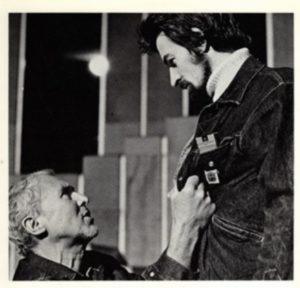
Anthony Quayle (left) and Eric Schneider in “Everyman” at the Clarance Brown Theatre in 1975. (University of Tennessee)
Carol: Actually I came down, I was here visiting, and I auditioned for him to do the Scottish play, and he was just lovely. And he said, “You know, when I did this play before I did it with Vivien Leigh.” And he said, “Vivien is a, she is disturbed.” And he said, “There’s something VERY dark about her. And I think there’s something VERY dark about Lady Macbeth, and you are a lovely actress. (laughter). You’re not very dark…” So I didn’t get the part, but it was very nice. And then I once auditioned for, I didn’t know I was auditioning for Tennessee Williams, but I auditioned for my friend, Ed Sherin was going to direct one of his (Tennessee Williams) later plays, The “Red Devil Battery Sign” on Broadway. He had done it in London with Claire Bloom, and they were going to do it on Broadway with Claire Bloom. And he asked me to audition to understudy Claire Bloom. So, I went in to audition and there was a very, kind of, serious speech and I was right in the middle of it and it was on the stage of a Broadway house, I forget which one. And somebody out there laughed. And I was terribly upset, but I finished. And Ed said, “You got so much better.” It was Tennessee Williams who laughed. And he said. “You just clicked, something in you. You were wonderful after that.” And I got the part, but then I didn’t do it. I did something else. But I said, “Why did he laugh?” And he said, “He laughed because you were good. He LOVED to hear his words. And when people did it right, it just delighted him.” He said, “It was a laugh of absolute delight.”
Jack: Wonderful. I wish this were a full profile. When I talk about your whole life, I mean, we’re here, I guess, mainly to talk about Knoxville stuff, but there’s plenty of that to talk about too. But I’ve always been interested in your whole career, and grateful that you came back.
Carol: Well, I came back to be with mamma. And I didn’t know she was going to live to be 102, almost 103. (Jack: ten days short.) And now, there’s, I mean, there’s no, I guess I’m here to stay. There’s really not much point in going back.
Jack: Well, very selfishly I hope so. You’re a credit to the arts community here.
Carol: Thank you, thank you.
###
Transcribed by Sherry Wallace Barry.
Special thanks to the Aslan Foundation for programmatic support.
